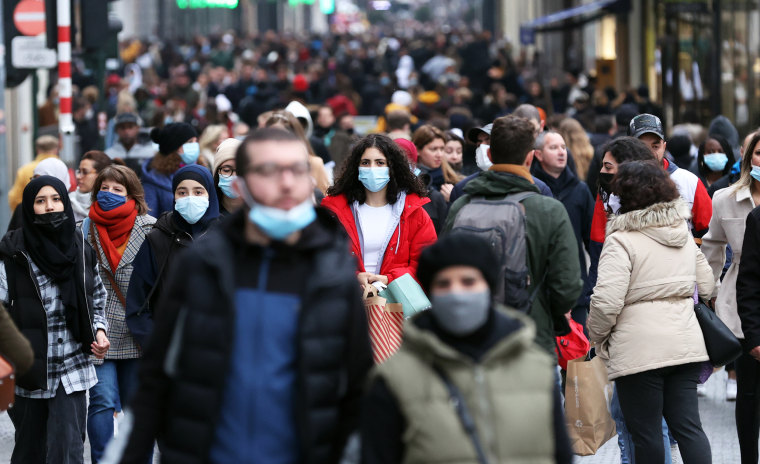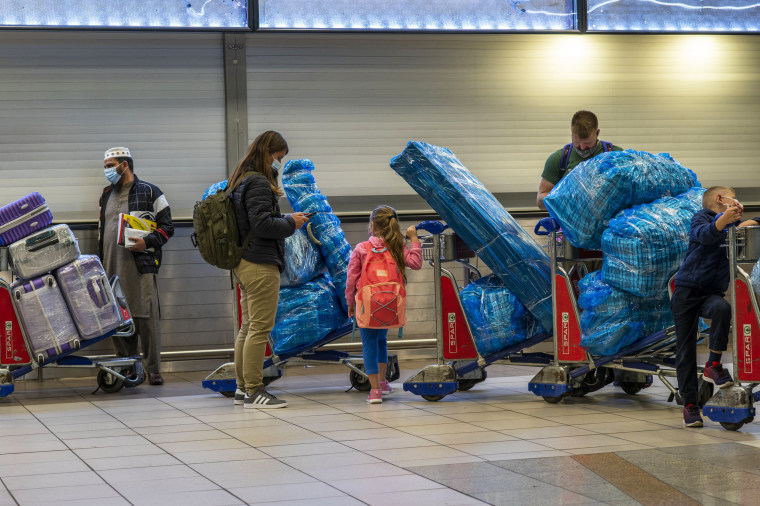The World Health Organization on Friday classified a new variant first identified in southern Africa as a "variant of concern." As the world continues to learn more about the new variant, which WHO named "omicron," epidemiologists say countries around the world should be on the alert.
In a statement released Friday, WHO said preliminary evidence suggested "an increased risk of reinfection with this variant" as it added the new discovery to the list of variants of concern, giving it the name "omicron."
Members of the organization convened for an emergency meeting earlier Friday to assess the seriousness of the new variant, B.1.1.529, which prompted global concern after it was found to carry a high number of mutations.
WHO said the number of cases of the variant appeared to be rising in almost all provinces in South Africa. It also said the variant had been detected “at faster rates than previous surges in infection, suggesting that this variant may have a growth advantage.”
Already, within days of the new variant being identified, governments in Belgium, Hong Kong and Israel have identified cases of the new variant, with the latter identifying at least one case in a traveler returning to the country from Malawi, while two others with suspected cases had been placed in isolation.
And as alarm grows over the variant's spread, a number of countries have rolled out new travel restrictions, including the U.S.
'Like trying to contain the wind'
Speaking with NBC News in a phone interview on Friday, Dr. Michael Osterholm, an epidemiologist at the University of Minnesota, warned that the variant already appeared to be "already out of the barn."
"Already, you see Belgium has already had a case, Hong Kong. If we're detecting those cases with our limited amount of virus sequencing that we're doing around the world, you have to know that this virus is in a number of other countries already," Osterholm said.

Download the NBC News app for breaking news and politics
"So, at best, you can possibly slow down the spread around the world but trying to contain this virus to (southern Africa) right now is like trying to contain the wind," he said.
But while that might be the case, Osterholm said it was still too soon to say what the impact of the new variant might be.
Dr. Deepti Gurdasani, a clinical epidemiologist at Queen Mary University of London in the U.K., agreed. However, she said that while there was still much to learn about the new variant, she was alarmed to see how quickly it has spread in southern Africa over the past two weeks.
“It's seriously, seriously concerning,” she said. And the epidemiologist said she would prefer to see countries “overreact and then scale back than under-react” to the new development.
On Friday, shortly after WHO announced it had classified omicron as a variant of concern, the U.S. said it would be restricting travel from South Africa and seven other countries starting Monday.
Senior administration officials said they were taking the decision "out of an abundance of caution" and after receiving advice from the Centers for Disease Control and Prevention and Dr. Anthony Fauci, the chief medical adviser to President Joe Biden.
Earlier in the day, Fauci had said there was no indication that the variant had already reached the U.S. However, he said it was possible.
“It’s something that in real time we’re learning more and more about," he told CNN.
On Thursday, the British government added six African countries — South Africa, Botswana, Zimbabwe, Lesotho, Eswatini, and Namibia — to its "red list," which will require those arriving from those nations to quarantine for 10 days at a government-approved hotel.

Meanwhile, Israel, Japan, Singapore and a number of European countries also announced new travel restrictions, while the European Union's executive recommended a suspension of air travel from affected nations.
In the U.K., Gurdasani said that she was personally in favor of introducing a quarantine mandate to all arrivals, regardless of where they were traveling from, and enforcing Covid testing at the border "until we know" more about the new variant.
"We’ve made a lot of mistakes before, I think," she said. "With delta, I think a lot of countries were slow to act."
Danny Altmann, a professor of immunology at Imperial College London, said he understood why countries have been quick to react to the rise of the new variant.
After some nations saw a slow response to the delta variant, he said, "we must come to learn how to react better the second and third time."
Still, he stressed that as it stands, it is the "uncertainty" surrounding the new variant that is most worrying, with the variant having mutations "that we haven’t seen before."
"We're not sure how scary it is," he said.
'This should not be a surprise'
Dr. Osterholm said the identification of a concerning new variant "should not be a surprise" to anyone.
“We've recognized all along that the future course of this pandemic was going to be really decided by two different factors," he said.
The first, he said, is whether humans' immunity to the virus gained from Covid vaccinations and past infections would wane over time. The second, he said, is whether a new variant might develop that could "be either more infectious, more likely to cause severe disease or able to evade immunity from vaccines or previous infection."
Already, we are seeing the first question answered in real-time with waning vaccine efficacy partly blamed for recent surges in Covid cases in countries with high vaccination rates.
It is still yet to be determined, however, what impact omicron might have.
Still, Osterholm said: "We’ve been saying all along that there was no reason the believe that delta was the last king of the variants.”
